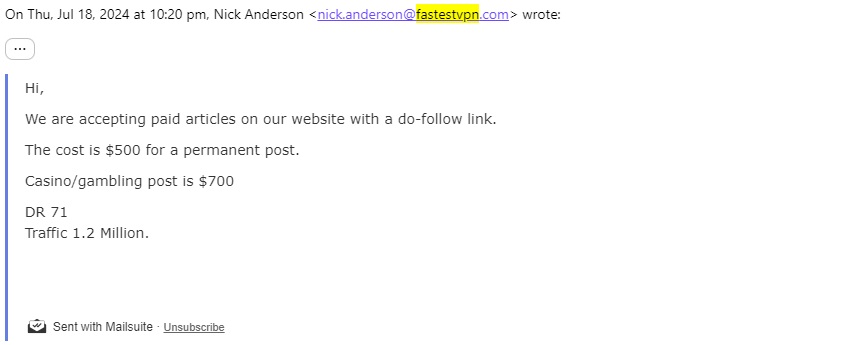This controversial unethical marketing move comes on the heels of reportedly sluggish VPN client sales, prompting the company to explore alternative revenue streams.
FastestVPN, known for its competitive pricing and robust security features, has been accused of sending unsolicited spam emails to businesses offering to sell links.
The spam emails include offers for links in non-relevant niches such as online casinos, priced at a hefty $500 per link. A VPN service website is not inline with publishing content and links in the online casino industry and is regarded as pure spam.
The practice of selling blackhat links is widely frowned upon in the digital marketing industry and can have severe repercussions for a company’s online reputation and search engine rankings.
Blackhat links refer to links that are acquired through manipulative or unethical practices, contrary to search engine guidelines.
Industry experts have expressed concern over FastestVPN’s recent actions, emphasising the potential damage to its credibility and the trust of its user base.
Such practices not only undermine the integrity of the VPN service but also raise ethical questions about how companies choose to monetize their platforms.

The emails, reportedly sent under the pseudonym “Nick Anderson,” highlight a troubling trend in digital marketing practices and an attempt to the services revenue.
Example of paid link URL sold by Fastest VPN – Brought by paying casino site client
The Benefits of Using a VPN While Playing Live Casino
Anchor Text – High Payout Casinos & The Best Paying Online Pokies | Australia Internet Pokies
Such tactics not only undermine the integrity of the VPN provider but also erode trust among potential customers who value transparency and ethical conduct.
The inclusion of links to unrelated and potentially spammy websites, such as casinos, at a premium rate of $700 per link, is seen as a desperate attempt to bolster revenues.
The recent allegations against FastestVPN for selling blackhat links, including those to spammy websites like online casinos, underscore growing concerns about the company’s financial health and marketing strategies.
Industry observers point out that resorting to such practices suggests potential financial strain within FastestVPN, prompting them to explore unconventional revenue streams.
The controversy surrounding FastestVPN serves as a stark reminder of the pressures faced by companies in the competitive VPN market and the lengths to which some may go to maintain profitability.
Guest posting, a legitimate SEO tactic when done ethically, involves publishing content on external websites with a link back to the client’s site.
However, the controversy arises when such practices are abused for monetary gain, often involving the promotion of irrelevant or low-quality content for a fee.
In FastestVPN’s case, these emails reportedly include offers to publish guest posts with links to various sites, including those in unrelated sectors like online casinos, for a considerable fee.







